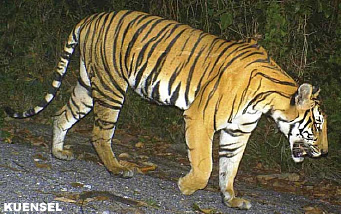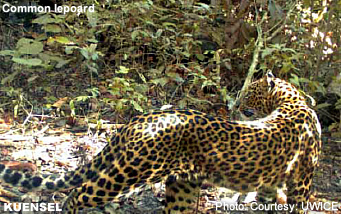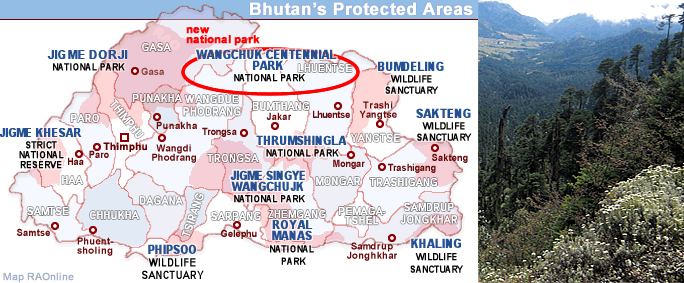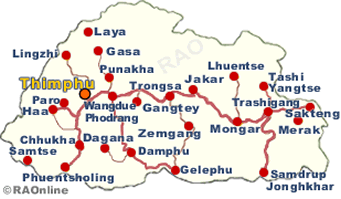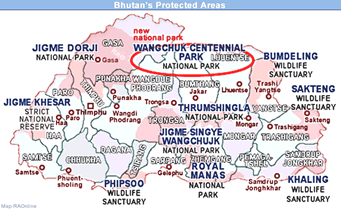 |
Bhutan's Nature National Parks |
|
 |
Bhutan Information |
|
|
 |
| Bhutan's
National Parks, Wildlife Sanctuaries and Nature Reserves |
 |
|
Royal Manas National Park |
 |
WWF supports Community based Eco-tourism projects in Royal Manas National Park
|
Ecotourism as an alternative community based livelihood option had never been explored in Royal Manas National Park (RMNP). With a population of about 10646 people representing 1026 households and enriched with diverse natural setting, rich culture, tradition and biodiversity, RMNP has always been a potential ecotourism destination. |
|
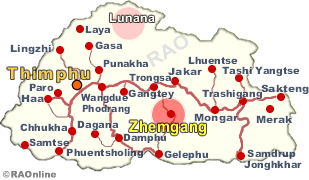 |
Realizing this, in 2010 RMNP initiated its first set of community based ecotourism projects with financial support from WWF Bhutan.
Following which, a pilot community based ecotourism along the existing Gomphu-Manas-Norbugang eco-trial was strategically developed. Besides upliftment of the communities through alternative income generation opportunity, the project also aims to promote local stewardship and community participation in the park's conservation efforts.Over and above that, WWF's support also went towards enhancing the skills of the nearby communities to better cater to visitors compatible with contemporary hospitality methods. Once self reliant, it is hoped that dependence on forest resources and illegal activities will reduce significantly.
| The findings, forest and park services officials said was a rare one because big cats were normally territorial and did not share an area.
The cats were captured on camera traps that forest and park services officials planted in the area as a part of their survey.
Forestry officials confirmed the cats included the Tiger, Leopard Cat, Clouded Leopard, Leopard (black), Marbled Cat, Jungle Cat, Golden Cat and Fishing Cat.
|
|
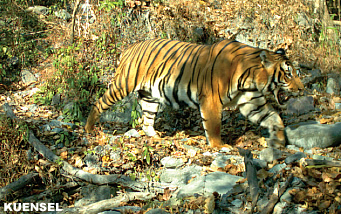 |
About 200 camera traps were fixed at 88 different locations of the park last year. The park is the oldest protected wildlife sanctuary in the country since 1966.
WWF Bhutan's Senior Program officer, Mincha Wangdi who is also the project coordinator said "The community tourism will empower communities to make supplementary income, enhance their knowledge and understanding of local natural resources and cultural assets and in the process support the park in its conservation efforts".
The eco-trail takes you through the core of Zhemgang and descends down to the foothills adjoining the plains of Indian Manas. The exit can be made either from Indian Manas or from Samdrupjongkhar district of Eastern Bhutan. The walk through warm broadleaf forests has a rich diversity of birds, plants, butterflies and wildlife.
Five eco-camps at Gomphu, Pangtang, Shillingtoe, Pangbang and Norbugang have been set up along the trial for visitors.
The eco-camps and the trails are both being managed by community committees with a benefit sharing mechanism (75% goes to individuals providing services; 20% towards community fund; and 5% to the park). RMNP in collaboration with Nature Recreation & Ecotourism Division, Ministry of Agriculture & Forests and Tourism Council of Bhutan has also drawn up strategy plans for its marketing, service delivery, monitoring, upkeep and others.
The first eco trail Gomphu-Pangtang (1457 masl) at Gomphu can be reached from either Zhemgang or Sarpang districts. Located just above the Gomphu Park Range office, two eco-lodges with bathroom, toilets, dinning and kitchen facilities have been built. Hikers can rest here overnight and catch glimpses of numerous birds such as barbets, hornbill, bulbuls, doves, wood pecker and cuckoos among many others.
Taking a descent through mixed broadleaf forest and thick undergrowths, the trail takes you to the next eco camp in Pangtang (239 masl). Located on the right bank of Mangde River, the halt enables visitors to not only view the picturesque view of the river but also have a glimpse of Pangtang settlements which is typical of lower Kheng region of Zhemgang.Here too, there are good birding opportunities.
Possible sightings include thrushes, drongos, hornbills, partridges, pheasants, bulbuls, tree pies, barbets, eagles, and many more. Next we arrive to Shillingtoe campsite (420 masl) from where a great view of the area can be captured owning to its slightly higher elevation.
The last halt of the trail at Pangbang campsite (160 msal) is located at the junction of Mangde and Dangme River. Here visitors have the option to splurge in outdoor activities like boating, river rafting, elephant rides and wildlife safaris. If lucky, one can also sight goral, capped langur, cormorants and many other bird species.
RMNP's park manager, Tenzin Wangchuk said "RMNP has a huge potential to attract tourists nationally and internationally owing to its rich wildlife presence & natural ecosystem. However, at the same time, the priority of the park will also be to properly manage and regulate the eco-provided so that balance between development and conservation is maintained".
 |
| Source: WWF Bhutan 2012 |
top
top
| Wildlife and People in Bhutan |
 |
| Information on Bhutan |
 |
top
| Links |
 |
 |
 |
External
links |
|
|




